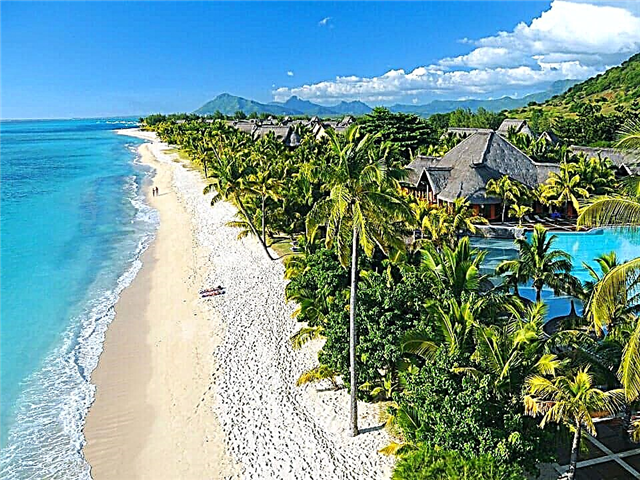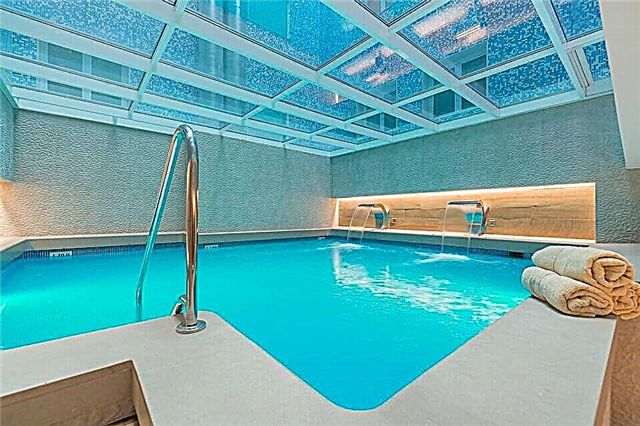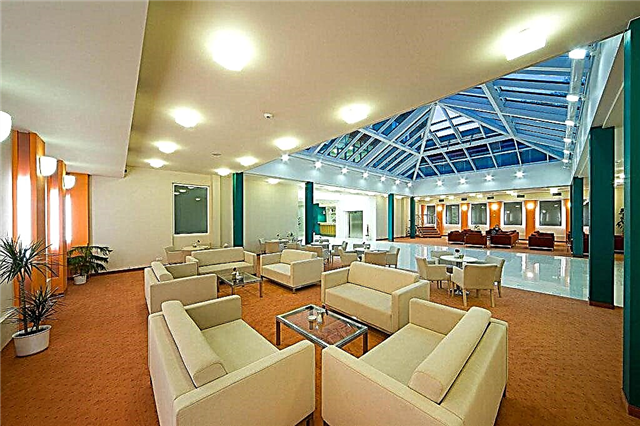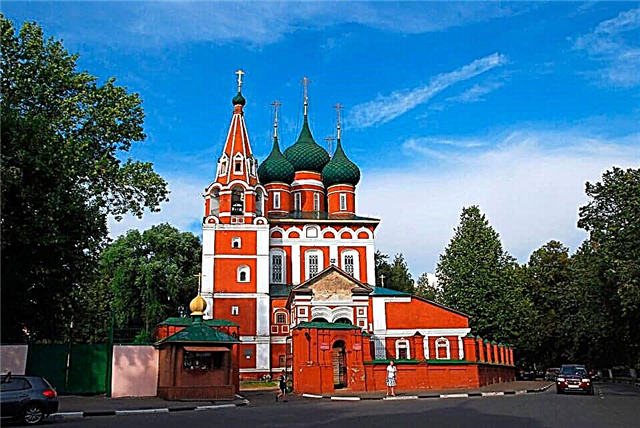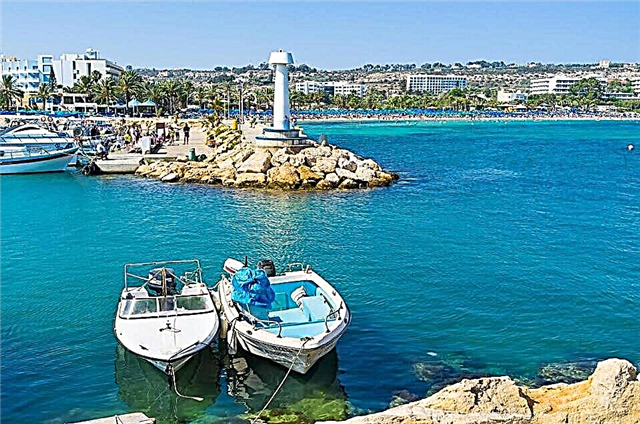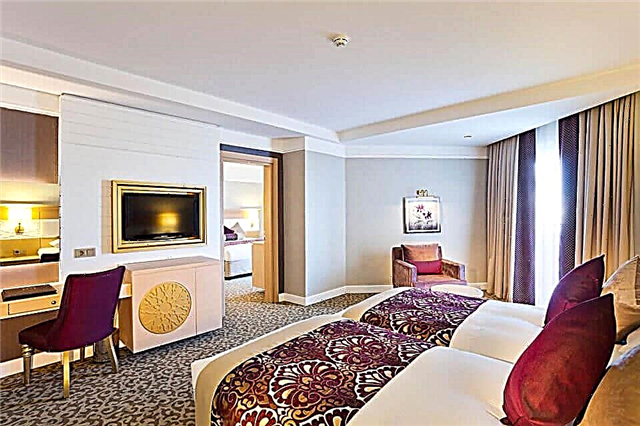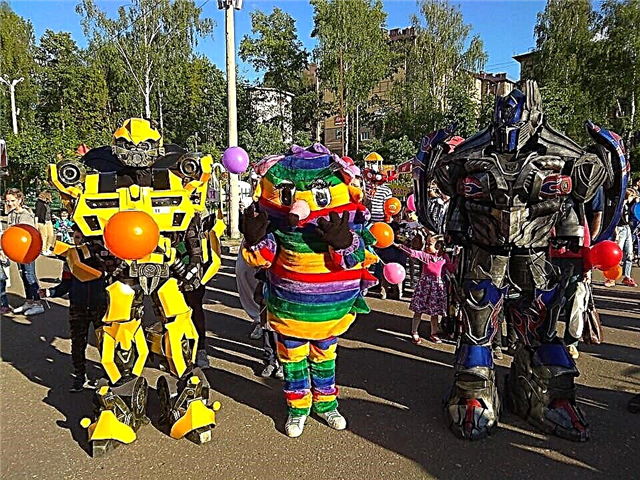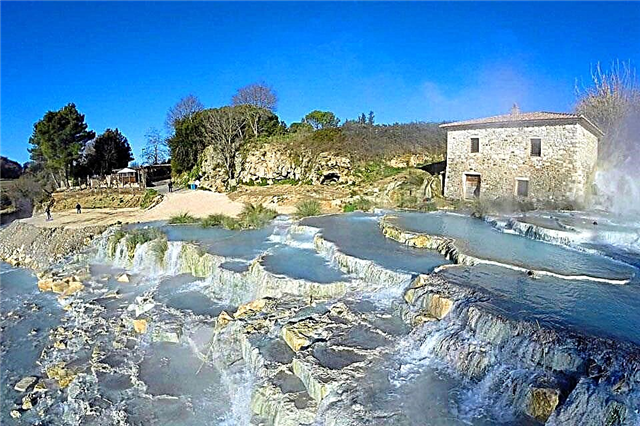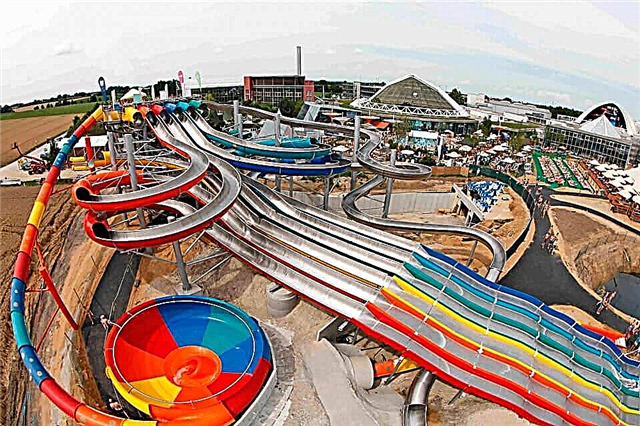Famous Germanic order and pedantry are the main attractions of Germany. What does this mean? The fact that in any city in Germany it is easy to find your way, that 4 * on the hotel sign you can trust that the transport will start a minute later or earlier than indicated in the schedule, and the baked goods in this or that institution will certainly turn out to be very tasty. These conditions allow you to easily plan your trip and implement ambitious plans without unpleasant surprises.
To many, the country resembles a kind of mosaic: some of its parts, which are in no way similar to each other, when combined, make up an amazing picture. Germany is very rich in sights of various kinds, which include amazing medieval castles, ski resorts, beer gardens, impressive museums, modern architecture, high-tech car factories. The article provides information on the most interesting sights of Munich.
Old Pinakothek

This picture gallery is one of the most famous galleries in the world. It presents many works of the best masters of the Middle Ages. Opposite it is the New Pinakothek and the Modern Pinakothek, which also represent the works of masters of different times. 49 offices and 19 halls of considerable size are open to visit, where you can admire over 700 works. Among these works, the canvases of Bosch, Albrecht Durer, Raphael, Rembrandt, Rubens stand out.
Alte Pinakothek is located a little further than the Museum Quarter, you can find it at the following address: Barerstrasse, 27. You can take the bus (154), metro (2.8) or tram (27), you need to get to the Konigsplatz stop. The building is open daily from 10:00 to 18:00, excluding Mondays.
New Pinakothek

After the bombing during the Second World War, the building had to be rebuilt from scratch again, although its history began in 1853 as a collection of modern art paintings. Now it stores more than 3,000 works and 300 sculptures by eminent masters who worked on them from the 18th to the beginning of the 20th century, which take about 3 hours to view.
The works are divided into categories according to periods and directions, which are represented by the paintings of Thomas Lawrence, Karl Rothmann, Joseph Anton Koch, Jean-François Millet, Franz von Lenbach, Wilhelm Leibl, Claude Monet, Vincent van Gogh and hundreds of other famous artists.
Pinakothek of modernity

The Pinakothek of Modernity unites 4 museums dedicated to painting, applied art, architecture and graphic collections. It is advised to bypass the art gallery from the end, provided that you want to get to other museums on that day, since it is there that the most famous masterpieces of Pablo Picasso, Salvador Dali and other cultural figures are "clustered" there.
Masterpieces from burnt cellophane canvases to truly amazing and beautiful paintings painted with multi-colored pens are presented with works of modern art. The Architectural and Graphic Museums boast the largest collection of blueprints in the world. All exhibitions are open from 10:00 to 18:00 except Monday weekend.
Brasserie Hofbräuhaus

This brasserie opened in 1607. Previously, it had the status of a court brewery, but later it was transformed into a kind of find for connoisseurs of this drink. The Hofbräuhaus consists of a beer hall and 3 other halls. It is possible to simultaneously accommodate about 4 thousand people. It was found that 50 liters of the foamy drink is drunk here every minute. On the 1st floor is the main hall called Schwemme. Visitors enjoy the orchestra every evening. Every evening over a hundred tables are booked by regular customers.

There is a designated place for storing personal mugs of the most honored guests of the restaurant. The Breushtüberl is made in a retro style. Mozart often dropped in here, and his portrait still adorns this room today. The ceremonial hall is located on the 3rd floor. It often hosts a party for the elderly. Nearby is the Hofbräuhaus Museum, famous for exhibits that tell about the history of the institution.
The Hofbräuhaus is ready to provide a menu in a variety of languages, not excluding Russian. Prices range from 5 EUR per mug of 0.5 and 9 EUR per liter. Only German varieties are offered. A portion of beer with mustard, 2 sausages costs about 15 EUR. The restaurant is located at Platzl 9, easily accessible by underground to Odeonsplatz. The institution is open daily from 09:00 to 23:30.
Azamkirche

This church is considered one of the most beautiful architectural creations of the city. The Baroque building is lavishly decorated with stucco moldings and a white and gold facade. It seems that such an enchanting world was transferred from the ball to the real one: its luxurious, but at the same time fragile appearance is so incredible. Inside the church, nothing can disappoint either: the interior, replete with gold-colored objects, and its pastel colors create a harmony that allows you to plunge into the atmosphere of a fantastic castle.
Tourists are amazed at the interior decoration, because the interiors seem to be the work of skilled craftsmen who meticulously painted them by hand with the thinnest brush. Inside, everything is divided into 3 zones: the tier of the balcony - made in white and blue, which is dedicated to the emperor, the middle one - the choir and the lower one, consisting of benches and aisles. The upper part resembles the Kingdom of Heaven.
The church is located at the following address: Sendlingerstrasse 32, Asamkirche. Nearby there is a metro station, as well as a tram.
The building is open from 9:00 to 18:00, and on Friday from 13:00 to 18:00. Many people enjoy attending Sunday Mass, which takes place at 9:00.
English garden

An equally famous place is the garden located in the center. Every day it is visited by 1000 travelers and residents of the city, who wish to relax by the reservoir or in the shade of trees. Connoisseurs of outdoor activities like to spend time here. Also, the northern and southern parts of the garden can be explored by cycling a bit. Surfers also visit the park. After all, the reservoirs that create the wave are perfect for this sport. The park is also suitable for those who like quiet rest, including nudists. In addition, there is a beer garden with an amazing Bavarian drink and a Japanese garden, famous for its teahouse.
The territory of the park is larger than the famous Hyde Park and Central Park. The garden is a favorite place for travelers. Its size, the attractions located in it (for example, Monolter), the atmosphere itself, the numerous glades where nudists can relax, and of course the beer gardens have turned the English Garden into a very famous place all over the world.
The park is located near the State Chancellery. A tourist who decides to use the metro needs to take the U6 line, by tram - number 17 from Marienplatz, and by bus - number 100 to "Haus der Kunst". It is easy to walk from Marienplatz in just 5-10 minutes. Like other parks, you can get here around the clock, it's free.
Bavarian Archaeological Museum

This museum is positioned as a "museum of early archeology". Its main focus is the ancient archeology and history of Bavaria, which is even separated into a separate section. Exhibits that are younger than the 14th century are incredibly difficult to find. The Archaeological Museum was founded in the 19th century, for some period it served as a repository of paleontological objects found during excavations. This collection was growing rapidly, and therefore it was decided to separate it into a separate building.
The museum has its own restoration and archaeological group - they carry out excavations and, subsequently, restoration.The collection of this museum is one of the best in Germany. For example, there are several rare and entertaining halls: "The Great Migration of Nations" and "The Age of the Celts", which contain many unique exhibits.
The collection of the Bavarian Museum is divided into several parts. The building can be found at the following address: Munchen, Lerchenfeldstrasse 2. To reach it, use any of the 2 underground stations - Odeonsplatz and Lehel. Open 6 days a week from 9:30 am to 5:00 pm, the building is closed on Monday.
Schloss-Blutenburg

How to unravel the many secrets of the country's ancient castles, as well as listen to mysterious legends? To do this, you can visit, for example, Schloss-Blutenburg, which is famous for the narrative of the forbidden love that happened between an ordinary girl and the heir to the duke himself. The father could not accept the choice of his son, which is why he sent him far away to his relatives, and the girl was brought to trial on charges of witchcraft. Also, the palace is able to enchant with its local surroundings. The amok was originally built in the 13th century.
Residents called this castle "Castle of the Blood". What does the name of the castle mean? This is unknown and, most likely, will remain a mystery forever. Schloss-Blutenburg is known not only for heartbreaking love stories, but also for its location between 2 lakes, striking late Gothic buildings and a good library. You can get to the palace on S2 to the Obermenzing station, from where you need to walk a few blocks along Verdistrasse.
Exact location: Seldweg, 81247 Munchen. The library is open on weekdays from 10:00 to 16:00, the chapel is from April 1 to September 30: from 9:00 to 17:00 and from October 1 to March 31: from 10:00 to 16:00.
Glyptotek

Why was the museum named so strangely - "glyptotek"? The first place in which the word began to be used almost everywhere was Bavaria. "Glyptotek" translates as "storage of sculptures", it is difficult to find a more appropriate term, because here they have collected a whole collection of Roman, as well as Greek sculpture, and no other items. The museum was founded especially for the king, in which he kept his own collection of sculptures.
Glyptotek was built by Leo von Klenze, in the end he decided to create a couple of buildings, made in the same style. Due to the decision to create such a huge complex, the construction of the facility lasted a long time, and the museum itself was opened only in 1830. Since that time, its museum has been constantly increasing, it is surprising that even during the war period the building collapsed, but its collection was almost not damaged ...

It is here that such well-known world exhibits as "Teneyskiy Kuros", "Aeginets" and "Munich Kuros" are kept. We must not forget that this exhibition consists of only stone objects - objects, sculptures, etc. No other materials are presented in the museum. The building can be found at: Munchen, Konigsplatz. Also on the square is the metro, which is easy to find by the name Konigsplatz. The museum is open from 10:00 to 17:00, and on Wednesday until 20:00. The day off is Monday.
Hellabrunn Zoo

The zoo is exactly the place where it is difficult to take children away. This large zoo was opened in 1911. It was the first geo-zoo in which the living conditions of all animals were tried to be as close as possible to their natural environment. Its territory was divided into peculiar zones that correspond to the habitat of animals in the usual environment.
Today the zoo is home to approximately 14,500 animals of over 650 species. Every year 1,500,000 children visit it. Amazing cases also occur - for example, not so long ago an elephant was born in the zoo for the first time in almost 70 years. You can also purchase a plan at the entrance, it can be found right at the checkout.

Arriving here, the tourist will immediately find himself in the great kingdom of flamingos. Then he will find himself in the jungle, watch the monkeys, and then see the aquarium. Behind the houses of the elephants, there is a platform for their walking and an aviary built for camels. Further away you can find turtles, and graceful leopards live opposite them.
Then, turning right, you can admire the horses grazing in the meadow. This is where the restaurant and a special playground are located. In order to get there, you need to take the U3 metro and get to Thalkirchen, then follow the signs. Then cross the bridge and find yourself at the very entrance to the zoo. The zoo is open daily from 9:00 to 18:00.
Maximilianeum

This is a building that certainly lives up to its grandiose name. The construction of the palace, which perfectly embodied the features of the Renaissance, took about 20 years. Today students live here, and the parliament itself is in session. Unfortunately, for obvious reasons, it is impossible to enter the building itself, but the mass of entertaining architectural details, as well as the richness of the facade, make up for this minus. The building's terrace offers a picturesque view of the city. The Maximilianeum is best viewed from the famous Maximilianbrücke bridge or the Maximilianstrasse.
The yellow tint of the Masimilianeum façade is a skilful fusion of Renaissance and Neo-Gothic details. For example, rounded niches hide tall windows, colorful mosaics adorn the pediment, and marble statues crown the roof. It is worth noting the terracotta stucco molding that adorns the facade, because it gives the palace the look of the Renaissance.
The Maximilianeum is surrounded by a beautiful park that is replete with manicured lawns. And skaters and cyclists rush along its roads, and residents of Munich itself also like to spend time here. Located at: Max-Planck-Strasse, 1. Entrance to the public is prohibited, but you can admire the exterior at any time.
BMW Museum

BMW is the abbreviation of the plant, which has been known for a long period of time. The plant began functioning in 1913 and specialized in aircraft engines. After the war, the treaty banned the production of aircraft in the country, and OTTO was forced to close the factory. Because of this, the company began to produce brakes for various trains.
Today BMW is an internationally renowned manufacturer of vehicles such as cars, bicycles, motorcycles and engines. Here you can see not only cars and other vehicles of the world famous brand, but even aircraft engines, which the company previously specialized in. The variety of cars such as coupes and sedans is literally eye-catching. In addition, you can admire the first motorcycle of this brand in the museum.
Car lovers will be able to get acquainted with the new product - the hydrogen car. The company's team believes that the future lies with hydrogen engines. Visitors are often surprised by the exposition located in one of the halls. The mesmerizing installation depicts small balls suspended from the ceiling. As they rotate, they appear in an amazing form - the company's kinetic model. You can get to the building from the main railway station, you need to get to Marienplatz and change to U3. From Monday to Saturday, the museum is open from 7:30 to 00:00, on Sunday - from 9:00 to 00:00.
Nymphenburg palace

This complex of palaces is striking in its beauty and luxury. Nymphenburg attracts a lot of attention - more than 400 thousand people annually. This is not surprising, because it, like the adjacent park saturated with infrastructure and combining the landscape zone, certainly deserves at least a particle of attention.
Numerous reservoirs, gardens, and parks adorn a large area of the palace complex. The decoration of the castle is not at all inferior to the external appearance. For several centuries, the palace has housed a porcelain manufactory, whose items are exhibited in their own museums in Nymphenburg.
The park is famous for its many pavilions, which are considered independent buildings. Amalienburg - the most famous of them, was built in the 18th century.Here, man-made lakes were constantly broken, a swimming pool, baths, a hunting lodge, a chapel, and a bathhouse were built. Because of this, the determination of a specific period of time for the beginning and end of construction causes some difficulties. From the very center, you can quickly get to the palace, for this you need to take tram line 17. The palace is located at: Schloss Nymphenburg, 1.
Munich residence of the Wittelsbachs

The Munich residence of the Wittelsbachs is one of the largest palace complexes in Europe, which will not take even a week to explore. The first palace appeared in the 14th century and served as a refuge for the Bavarian nobility, after which it was transformed and became a residence for rulers. Over the next 7 centuries, each member of the Wittelsbach dynasty expanded the Residence until it began to have 10 courtyards surrounded by 130 rooms.
The most popular halls among tourists are the Antiquarium, which hosted receptions, balls and banquets, the Treasury with the richest collection of jewelry and symbols of royalty, as well as the Royal Chambers, into which Ludwig the First even allowed residents during his departure. The cost of admission varies from 7 to 13 euros and depends on the hall you want to get into, and tourists are taken on a tour every day - from 9:00 to 19:00.
Marienplatz

Marienplatz is a square in the city center, the hallmarks of which are the column of the Virgin Mary, erected on the occasion of the end of the Thirty Years War, and two Town Halls, made in the Gothic style. Once upon a time, knightly tournaments were held here, which is reminiscent of the figures of knights in a clock on the facade of the town hall, moving at certain hours. Now it is a place for Christmas markets, concerts and rallies.
Here, in the Kaufhof shopping center and in the Ludwig Bech music store, they shop as gifts for their friends and relatives, and in the courtyard of the New Town Hall, you can taste authentic Bavarian cuisine. Under the square is the metro station of the same name, on several floors of which there are a lot of souvenir shops, flower markets and cafeterias with prices much cheaper than at Marienplatz itself.
German Museum

The German Museum has been operating since 1903 and amazes with the scale of its collections, from agricultural exhibits to the latest achievements in technology and space, containing more than 28 thousand items. Even a week is not enough to explore each room, of which there are more than 10, so it is better to set yourself a goal in advance to examine a couple of the most exciting ones for you.
They are dedicated to every branch of human development - navigation, aviation and space, textiles, glass making, ceramics, printing and minerals, beer and sugar production, photography and music. There is a separate Children's Kingdom hall for children, where a child can personally take part in experiments, try on the duties of a firefighter, engineer or ship captain. The doors are open every day from 9:00 to 17:00.
Odeonsplatz

The history of the Odeonsplatz square began in 1816, after which it began to rapidly acquire famous sights and monuments in the Baroque style. On the south side of the square is the Feldherrnhalle loggia with bronze statues of commanders, Count Tilly and Prince Wrede, guarded by marble sculptures of lions, and on the right side of it is the bright yellow Theatinerkirche church. It serves as a tomb for 49 rulers of the Bavarian Wittelsbach dynasty.
From here you can see the Munich residence, but the Hofgarten park, which arose in the 17th century thanks to the order of Maximilian the First, is located behind the Odeonsplatz. In the park, it is worth visiting the "Temple of Diana" and just enjoy a leisurely stroll through the park among flower beds and fountains. After a walk through the surrounding monuments of architecture, residents recommend the old cafe "Tambozi", as the most picturesque view of the square opens up from there.
St. Michael's Church

The current church of St. Michael is made in the Gothic style and looks more like a cake than a temple. The unreal beauty of the sanctuary is due to Duke Wilhelm, the son of Albrecht the Magnanimous, who spent a lot of money on its construction in the period from the 16th to the 17th century.
The facade of the building is decorated with 15 statues of the Wittelsbach princes, a statue of Jesus Christ and the Archangel Michael killing a dragon. Inside the church there is a tomb with representatives of the royal nobility - William the Pious, Ludwig II and Maximilian I. On weekdays, this place can be visited completely free of charge from 8:00 to 19:00, and on weekends from 7:00 to 22:00.
Allianz Arena

The Allianz Arena should be the first in the list of attractions not only for football fans and fans of the Munich team "Bayern", but also for people who are not fond of sports, because the stadium is included in the list of one of the most beautiful sports complexes in the world, which accommodates more than 70 thousands of people.
Interestingly, in the evenings and during matches, the stadium lights up with a million red, blue or white lights, which more than once fascinated drivers from the passing highway so much that they led to frequent accidents. For this reason, the color change occurs every half hour. In addition to football games, famous artists from all over the world give concerts here, there are shopping centers dedicated to the football club symbols, and LEGO products are on display.
New Town Hall

The new Town Hall has been decorating the city for over a century. For its construction, it was necessary to demolish a number of residential areas, which could not please people, but now, the Germans are proud of such a "visiting card" of the city. Now the 85-meter-high City Hall accommodates about 600 people and occupies more than 400 rooms, to the top of which you can climb with an elevator and enjoy the opening view of the city. Of particular admiration is the carillon, a musical puppet show of 32 figurines of the royal nobility and civilians who act out scenes from the history of the city for 15 minutes. Library rooms, an art gallery and even a meeting room are allowed to visit every tourist free of charge.
Andechs monastery

The Benedictine Monastery of Andechs is maintained primarily by a brewery on its territory with a 500-year history of production, in which lovers of the intoxicating drink come from all over the world. In the restaurant here you can taste it and traditional German cuisine. In addition, cheeses and medicinal tinctures for sale are made here, and the proceeds are enough to provide for Andeks himself and charity.
There is also a distillery, a stable, butchers' shops, playgrounds, chapels and temples with sacred relics that were brought to the monastery by the Bavarian dukes (the cross of the victory of Charlemagne, the breast cross of St. Elizabeth and many other rare Christian shrines). Every day, Andechs welcomes visitors from 7:00 am to 7:00 pm.
St. Peter's Church

The rectangular 92-meter bell tower of St. Peter's Church in the Gothic style with a long spire rises above the rest of the buildings of Marienplatz in such a way that it is impossible not to notice it. The origins of its foundation date back to the 10th century, after which it was destroyed several times during fires and rebuilt, absorbing the features of the Romanesque style, then the Rococo. At a height of 56 meters, there is an observation deck that will allow you to view the city from its height if you climb the 306 steps that lead to it along narrow corridors.
The entrance to the temple is decorated with gilded figures of angels leading to the main attraction of the temple - the pedestal on which sits Saint Peter with a tiara on his head, as the personification of papal authority. Corinthian columns and sculptures of other saints are installed around it. They do not ask for money for entering the temple, but for visiting the observation deck, you will have to pay a ticket worth 1 euro for children under 15 and 1.5 euros for adults.Opening hours - from 10:00 to 18:30 every day.
Bavarian opera

The opera house is not inferior to its counterparts, such as La Scala in Italy or the Bolshoi Theater in Russia, and is one of the symbols of cultural life in Germany. Since 1963, opera and ballet performances have been held here daily, the most famous conductors among whom were Hermann Levy, Richard Strauss, Bruno Walter, Peter Schneider, Kent Nagano and others. This list also includes the Russian leader of the ensemble - Kirill Petrenko.
Until the 20th century, the theater had a long-suffering history of formation, when the building was destroyed either as a result of a fire in 1823, or it was almost completely destroyed due to the bombing in 1943. After 15 years, the German architect Moritz Grauber set about restoring the old theater and in 5 years turned it into an outstanding monument of art and the pride of the German people. Now more than 2,000 people can simultaneously hear the works of the greatest composers.
Botanical Garden

The Botanical Garden greets visitors with an inscription on the poster "Always green - always beautiful!" and this is true, because hundreds of plants, accustomed to different climatic conditions, are provided with round-the-clock care. This place is especially attractive for its enchanting silence, which can be enjoyed on benches surrounded by tangerine trees, cacti and waterfalls with turtles.
In the garden, you can also emphasize useful information, for example, about the cultivation of rice plantations, the germination process of which can be seen with your own eyes. Deciduous and coniferous trees, exotic southern flowers and plants that live in the waters of the aquarium and pools, alpine slides and sculptures can be viewed every day from 9:00 to 16:00.
Olympic park

The Olympic Park is represented by a complex of architectural structures from a skating rink, a velodrome, a water and Olympic stadiums, as well as a 290-meter Olympic tower with several paid observation platforms overlooking the Alps and surrounding areas. Until 2005, the stadium was the venue for the matches of FC Bayern, but after the construction of the Allianz Arena it fell into disrepair. At an altitude of 190 meters, there is a restaurant with a not very cheap assortment, but the view of the cherry blossoms park and Lake Olympia with ducks and swans is worth it. There is a BMW Exhibition Center on the territory of the Olympic Park, there is no need to pay to enter it.
Aviation Museum

The Aviation Museum or "Schleissheim Aviation Shipyard" will be interesting not only for the theoretical part presented by the developments of Otto Lilienthal's gliders, but also for the practical part, where you can climb into the cockpit of a helicopter or hang glider, which will be especially interesting for a child, and even fly with a pilot as a passenger ... On the territory of the museum, there are circles for aircraft modeling and training for young pilots. Every day from 9:00 to 17:00 you can see the flight exhibits for 3 euros for children up to 15 years old, and for 6 euros for adults.
Church of Theatinerkirche

The creation of the Teatinerkirche church, executed in the Italian Baroque style, owes to the romantic story of two lovers - Henrietta Adelaide, Princess of Savoy and Prince Ferdinand Maria. They were promised to each other long before they met, but the meeting was postponed every now and then, until, finally, on a long-awaited trip to her husband, the girl fell in love with one of the Bavarian horsemen sent to guard the royal carriage.
The granddaughter of Henry the Fourth was overshadowed by the upcoming wedding, but what was her surprise when the same Bavarian horseman turned out to be the prince. Already married, Henrietta promised that if a son was born, she would build a church in honor of Saint Cayetan of Teatinsky, the patron saint of women in labor. Now the bodies of the princess, spouse and other representatives of the Wittelsbach dynasty rest within the walls of the church. The church is open every day from 6:30 to 20:00.
Palace of Justice

Or as it is also called - the Palace of Justice, has been decorating the city center since 1897 thanks to Friedrich von Thiersch, who decorated the roof of the building with a glass dome with a height of 67 meters, an innovative solution for that time. The main part of the building is made in the neo-baroque style, but was supplemented by two clock towers in the Gothic style, when there was not enough space for the judiciary and in 1905 a forced extension was made.
It is now the seat of the Constitutional Court and the Supreme Land Court, which have peacefully dealt with human problems since 1943, when all members of the White Rose organization were executed. Twenty-year-old students were members of the anti-fascist regime, for which they paid with their lives. Now they are declared heroes and several streets in Germany are named after them.
Legoland

It is better to start a tour of the park with a sightseeing walk on a mini-train that meets children at the gates of the entertainment complex. The locomotive will take you past 8 thematic zones, consisting of attractions not only for children, but also for adults. The most interesting of them are considered "Land of Miniatures", "World of Adventures", "Kingdom of Pirates" and "Knight's Kingdom". Lego constructions, interactive shows and live exhibitions are striking from one site to another.
In addition to playing attractions, meeting animals and sailing on boats, the park's developers also took care of the intellectual development of children, where, with the help of assistants, you can develop your own model of the constructor. A distinctive feature of the Legoland game complex is a driving school for young motorists, where, after passing a driving test, you can get a driver's license. The park is open from March 19 to November 6 every day from 10:00 to 18:00. If you buy a ticket in advance and issue it on the official website, then the price for one person will be about 30 euros.
Therme Erding water park

The largest water park in Europe (200 thousand sq. M.) With artificial beaches would be more fair to call a water complex, since in addition to attractions there are saunas and spa centers on its territory. Thermal pools (2 outdoor and 1 indoor) will be useful for adults, and 20 indoor and 8 outdoor water slides have a different age range - some are allowed only from 14 years old due to acceleration up to 72 km / h, others are allowed for children up to 6 and older.
On the territory of the pools, several of which imitate sea waves and are enriched with minerals and elements similar to the composition of the Dead Sea, there is a beach bar "DiamondBay", massage chairs and a volleyball court. You can also visit the Bali Hall, which offers yoga classes and oxygen air baths. Treatments such as body massage, facials and rose petal baths can also be ordered in your room. The complex is open every day from 9:00 to 23:00 and it costs 30 euros for a day ticket, which can be extended for 3 euros per hour.

